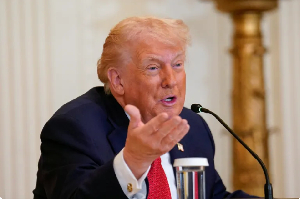Ghana has been cited as the 5th best country in Africa in connecting well to the global trade system.
This depicts improvement in how the country trades with the rest of the world and how information and finances move in and out of the country.
The country comes behind Mauritius, South-Africa, Nigeria, and Togo in the DHL Global Connectedness Index 2012, which has been developed to provide stakeholders with the most comprehensive and timely source of hard data and analysis to show the actual extent and direction of globalisation around the world.
The Managing Director of DHL Express sub-Saharan Africa, Charles Brewer told the B&FT in an interview in Accra that improvement in the country’s ranking will help it to attract increased volumes of foreign direct investments and create jobs.
“If you are thinking of locating a regional office or manufacturing site in Ghana, you need to find out how easy it is to move fleet and money in and out of the country, how easy the supply chain works, and how Customs work; these are key reasons why a company would pick Ghana over other countries.
“The more Ghana moves up that ladder -- Global Connectedness Index -- the better it is in terms of sustainability, job-creation and so on and so forth. So I think Ghana has an amazing job of recognising the key things that it needs to get it right to attract companies to come here and keep them,” he said.
The DHL Global Connectedness Index measures more than 140 countries and looks at how connected they are with the rest of the world in terms of how much trade a country does, how easy it is to move people, information in and out of the country, and also how capital moves in and out of the country.
According to the latest DHL Global Connectedness Index, Ghana’s movement to the top of the ladder was helped by oil production in the Jubilee Field and large FDI inflows over the past three years.
Mr. Brewer noted that the country’s trade competitiveness however rests with the small- and medium-scale enterprise operators who drive much of the economic activities.
He said DHL has designed a training programme to motivate and equip SMEs with the requisite knowledge on the global trade system.
He said the training programme, which is open to all interested SMEs in the country, is expected to start early next year and will involve both physical and virtual contacts.
“Motivation to trade globally has to do with knowledge more than anything else, and we want to help SMEs to understand that there is a huge opportunity globally rather than to think locally. Afterward, we hope that with the support of the government and banks, they will have the necessary financing to take their business global,” he explained.
Mr. Brewer said DHL is expecting to increase its access location points from the current 76 to about 100 in order to serve the needs of SMEs spread across the country.
“The SME segment from DHL’s perspective is growing more than 20 percent year-on-year, which is a staggering number. So all the things that we are doing is driving trade domestically and internationally -- which is a good thing.
“The opportunity is for us to expand our footprints within the country and service semi-urban and rural areas so that anyone can access our network, and the over-220 countries and destinations that we serve.
“There are hundreds of SMEs in Ghana, and we need to provide easy access and a team of highly-trained Certified International Specialists to lead them to the very obvious opportunities that trading with the world can present. DHL is committed to becoming their provider of choice -- and as part of that journey we will provide even more access points across Ghana,” he added.
Business News of Monday, 19 August 2013
Source: B&FT













